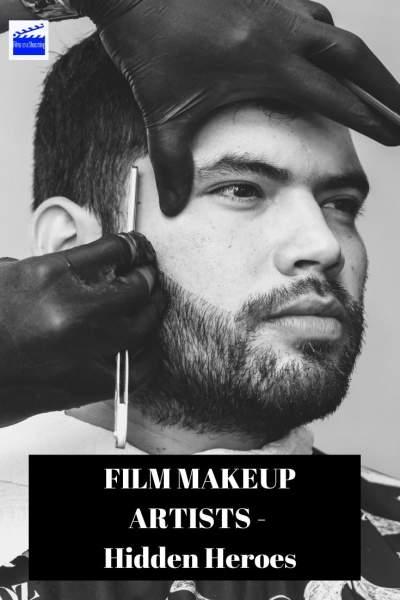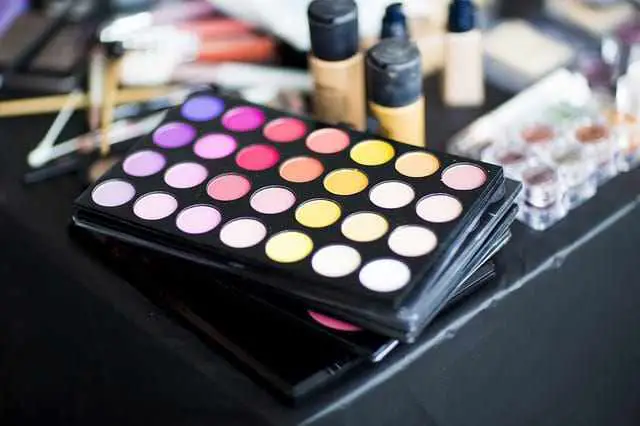Film makeup artists should be on every set. They really make a difference to the film that the eye can’t see. We take a look at how to find one for your student or microbudget film.
Do Student Films Need A Makeup Artist (MUA)?
Students get so involved with casting, crew, equipment, location and scheduling issues that wardrobe, hair, and makeup often get overlooked. And they’re not the only ones, because many zero budget enthusiasts also forget to plan for these small – but important – details.
They start filming in the glare of the sun or turn on strong lights in a small, crowded room that quickly overheats. Either no one notices the actors gathering a pink hue or else no one dares mention it, hoping it won’t matter.
Only later during editing do the ruddy complexions, scabby spots, random specks of dust in the hair and overdone mascara suddenly take on a life of their own. They subtly interfere with the audience’s ability to concentrate and engage with the character’s emotions on screen. Seriously, the small details are the ones which come back to haunt you.
That’s why hair and makeup artistry were included in our 25 essential steps to making a short film.
How Can I Find Makeup Artists Near Me?
A production team with a budget has easy access to professional, trained MUAs. They’re usually people they’ve worked with before, who initially arrived on the scene via recommendations from other industry friends. MUAs also advertise widely and often put together a decent website, so they’re not hard to find.
If you have no budget to pay an experienced professional you have to work harder to find someone with decent MUA skills. But it is possible.
There are always people looking to become a film make up artist. Whether they are gathering experience for entry to a course or to directly enter the industry, volunteering on your zero budget project will give them observations and opinions to talk about in interviews and sales pitches.
Students have the advantage of university and college contacts to quickly identify possible collaborators. But everyone can access a whole range of Facebook groups to directly contact filmmaking networks. With many of these groups boasting thousands of members, it’s a great way to find someone directly or receive good recommendations.
Casting websites are also useful. If you have no money, try Starnow. If you can scrape together even a minimum fee then head to Mandy jobs.
Insurance Even For Volunteers
Only invite an MUA to your set if you have insurance in place, even if they’re attending on a voluntary basis.
Too many people running microbudget sets don’t protect their volunteers with insurance, which is unacceptable.
If you’re a student filmmaker, your course provider usually covers your insurance – but do check!
Advertising Your MUA Role
Time and again you see micro-budget projects fail to attract the right people because the advert was badly written. For some reason, just shouting out the name of the project and the types of cast and crew required seems to be as far as many people get.
Perhaps they’re in a hurry and can’t spend time thinking beyond their checklist. Or maybe they think there are long lines of people desperately waiting in line for the chance to work for free on a project that actually very few people will ever notice happened even if it gets finished and released.
If you are going to the effort of making a film, no matter how short or low budget, sell and market it at every opportunity. You never know which potential future collaborators and employers may be watching.
- Advertise each role separately, with the role specified at the beginning of the title (most people bury the information deep in the Facebook post beyond the ‘read more’ tag. That doesn’t get included in notification emails and is only accessed by a small number of your potential audience).
- Explain the project generally, why you are making it and where it will ultimately land.
- Set out how many actors and extras will require MUA attention, and to what extent.
- If it’s a horror or period piece do they need specific skills?
- We’d hope you will pay your MUA, so set out the fee –
- Or, explain WHY you aren’t able to pay – this is seldom done and really irritates everyone
- Will you provide lunch or travel costs?
- Who will provide and pay for the hair and makeup equipment?
- Give truthful reasons about what benefit the MUA would get from involvement. Perhaps set out your past short film successes and give links.
- Give serious thought to IMDb listing, it is usually worth doing.
- Set out the dates and location – and don’t just specify a month!
- Have you got an entertaining picture of your project, team or MUA items to get people’s attention?
Film Makeup Artists Network Too
After the project is completed, don’t forget to credit your MUA and involve them in social media activity related to your project. Their followers and collaborating network are just as important as those of the actors and extras.
Putting a recommendation on a Facebook group where you found them also looks good to both you and them.

Film makeup artists are vital – and not just for horror! So don’t forget your film makeup artists when planning your next project. They could make all the difference to your film festival achievements.
Wondering How To Become A Film Makeup Artist?
If you think being a film makeup artist may be the career for you, head over to our page How To Become A Makeup Artist.


